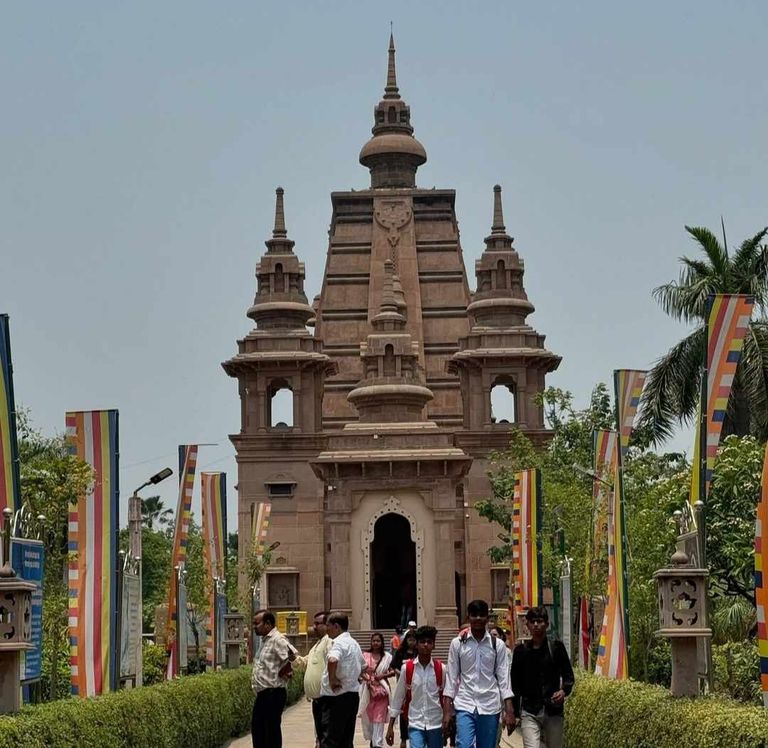
Varanasi, Delhi'den sonra beni şaşırtan bir yerdi... Trenden iner inmez kendimi kaosun içinde buldum... Tuk-tuk'a binip pansiyona giderken, ricksha'lar, tüm tum mağaralar, arabalar , insanlar, hayvanlar... Yolda her şey kazanan gibidir, borazan çalan da sahibi gibi kazanır...
Varanasi was a place that surprised me after Delhi... As soon as I got off the train I found myself in chaos... On the way to the lodge in a tuk-tuk, rickshas, all the caves, cars, people, animals... On the road everything is like a winner, the trumpet player wins like the owner...
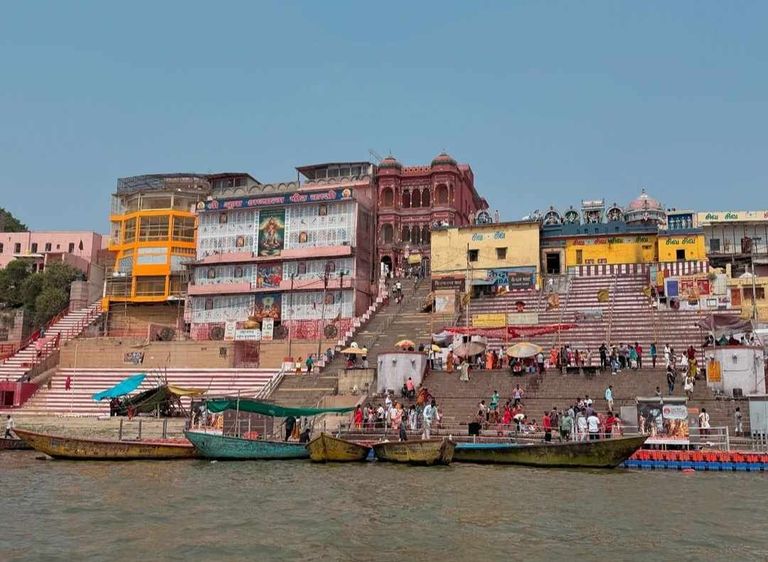
Pansiyonumuz şehrin göbeğinde... Çok güzel... Yürümek en sevdiğim... Delhi'den çok farklı! Daha gelişmiş, kirli ve güzel gibi... Varanasi'deki pansiyonumuz Zostel Varanasi... Yaşadığımız ev 4 kişilik ama beden odasında sadece biziz. sorun şu ki bu sefer tuvalet bizim odamızda ki bu da kaldığımız yer için bir lüks! Tren yolculuğunun etkilerinden kurtulup duş aldıktan sonra yerel rehberimiz otelin konforlu sohbet alanında bizi bekliyor. Kültür hakkında ilk bilgileri verdikten sonra hızla şehrin sokaklarına giriyoruz…
Our hostel is in the heart of the city... It's beautiful... Walking is my favorite... It's so different from Delhi! It's more developed, dirty and beautiful... Our hostel in Varanasi is Zostel Varanasi... The house we live in is for 4 people but we are the only ones in the body room. the problem is that this time the toilet is in our room which is a luxury for where we are staying! After recovering from the train ride and taking a shower, our local guide is waiting for us in the comfortable chat area of the hotel. After giving us the first information about the culture, we quickly enter the streets of the city...
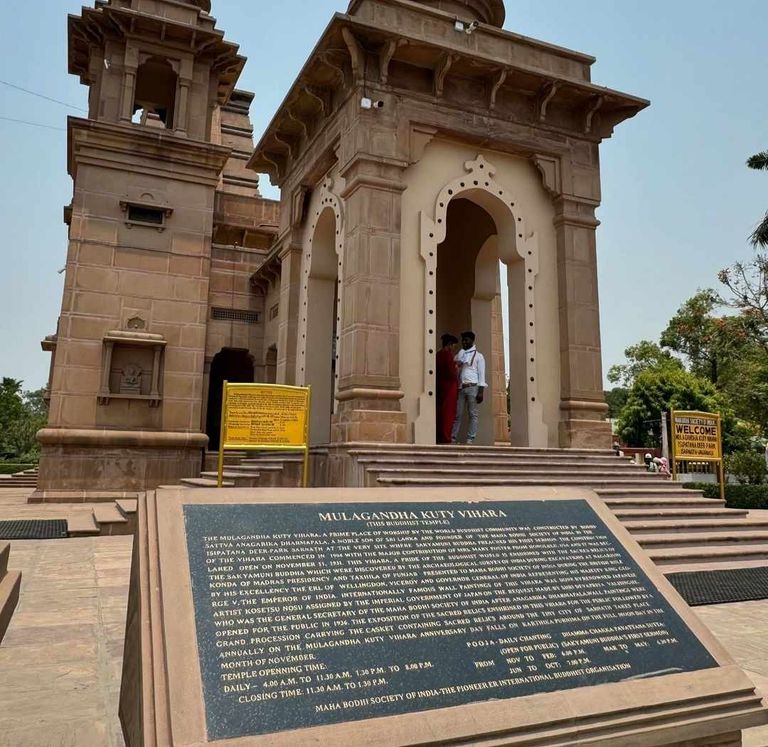
Bugünkü amacımız kutsal nehir Ganga'ya (Ganj) çıkan sokaklarda kaybolmak. Pansiyondan çıktığımızda rehberimiz bize pansiyonun dış duvarında Tanrı'nın bir resmini gösterdi. Şöyle açıklıyor: "Duvarda Allah'ın resmini gördüğünüz her yeri ibadethane sanmayın... İnsanlar, başkaları idrar yaparak çıkmasın diye, özellikle evlerinin üzerine Allah'ın resmini çiziyorlar..." Öyle mi? iş? Elbette işe yarıyor...
Our goal today is to get lost in the streets that lead to the holy river Ganga (Ganges). When we left the hostel, our guide showed us a picture of God on the outside wall of the hostel. He explains it like this: “Don't think that every place where you see a picture of God on the wall is a place of worship... People specifically paint the picture of God on their houses so that others don't come out urinating...” Does it work? Of course it works...
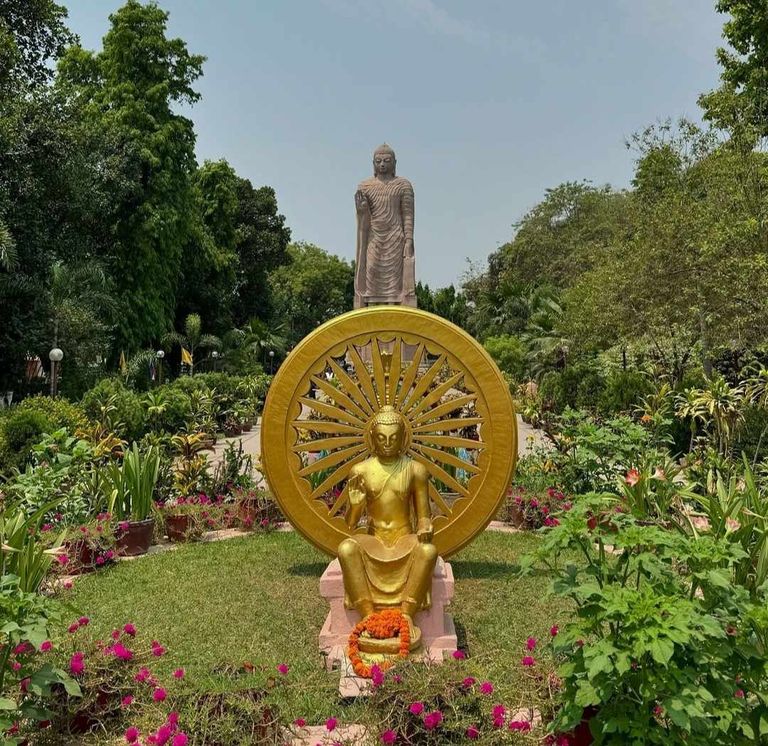
Otel ile market arasındaki Hint yolunda yürürken göl kenarında davul sesleri eşliğinde bir tören gördük. İnsanlar dua ederken göle ellerinde çiçekler ve mumlar bırakarak gölün temizliğini sağladılar! Sanırım bunu söylememe gerek yok :) İşte bir video... Çarşıdan geçerken buranın ipek kumaşlarıyla ünlü olduğunu öğreniyoruz. Yani Hintli kadınların giydiği köy kıyafetleri... Giydikleri kıyafetler köye göre değişiklik gösterebiliyor. Genellikle 6 metre civarındaki bir kumaş parçasını taşımak sanıldığı kadar kolay değil :) Sağda ve solda mağazalar, taze meyve sebze satıcıları ve sokak yemekleri her yerde.
As we walked along the Indian path between the hotel and the market, we saw a ceremony by the lake accompanied by the sound of drums. As people prayed, they left flowers and candles in the lake to clean it! I guess that goes without saying :) Here is a video... While passing through the bazaar, we learned that this place is famous for its silk fabrics. So the village clothes worn by Indian women... The clothes they wear vary according to the village. It is not as easy to carry a piece of fabric which is usually around 6 meters :) Shops on the left and right, fresh fruit and vegetable vendors and street food are everywhere.
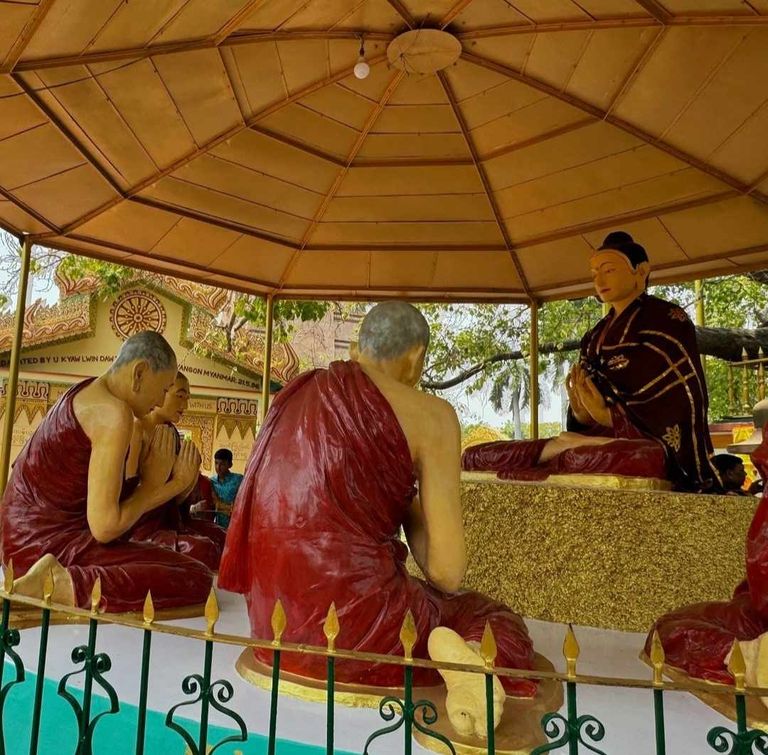
Yolda çiçek pazarında duruyoruz. Açık bir çiçek pazarı... Orada insanlar var ve mis gibi kokuyorlar :) Bildiğiniz gibi, nerede tapınak varsa... Ve ihtiyaç duydukları çiçekleri Tanrılarına sunarlar... Aslında her çiçeğin bir Tanrısı vardır. temsil ettiği; Mesela mor çiçekler
Ganesha'ya, sarı çiçekler Şiva'ya... İnsanlar bu pazardan çiçek alıp tapınaklarına götürüp tanrılarına sunuyorlar...
Varanasi'nin dar sokaklarında alışveriş devam ederken, yanımızdan cenazeler geçiyor... Ve herkes hayatın rutinine devam ediyor... Hindistan yolculuğumda gerçekten en çok hoşuma giden Varanasi... ölüme tanık olmak. .. Kutsal Ganj'dan gelen ışıklandırma törenini tekneden görebilmek... Ne yazık ki istediğim gibi deneyimleyemedim... Gelgit yağmuru nedeniyle sular çok yükseldi. Törenin yapıldığı alan ve hatta nehir kıyısındaki bazı tapınaklar sular altında kaldı. Evet, sudan şahit olamıyorum ama iliklerime kadar hissediyorum... Diyeceğim... İzlediğim belgeselde Monk ve Dr. Swami Varishthananda şunları söyledi:
On the way we stop at a flower market. An open flower market... There are people there and they smell good :) As you know, wherever there are temples... And they offer the flowers they need to their gods... In fact, every flower has a God that it represents; for example purple flowers
Ganesha, yellow flowers to Shiva... People buy flowers from this market, take them to their temples and offer them to their gods...
As shopping continues in the narrow streets of Varanasi, funerals pass by... And everyone goes on with the routine of life... Varanasi is what I really enjoyed the most on my trip to India... witnessing death. ... To be able to see the lighting ceremony from the holy Ganges from the boat... Unfortunately I couldn't experience it the way I wanted to... Because of the tidal rain, the waters rose very high. The area where the ceremony was taking place and even some temples on the river bank were flooded. Yes, I can't witness it from the water, but I feel it in my bones... I will say... In the documentary I watched, Monk and Dr. Swami Varishthananda said the following:
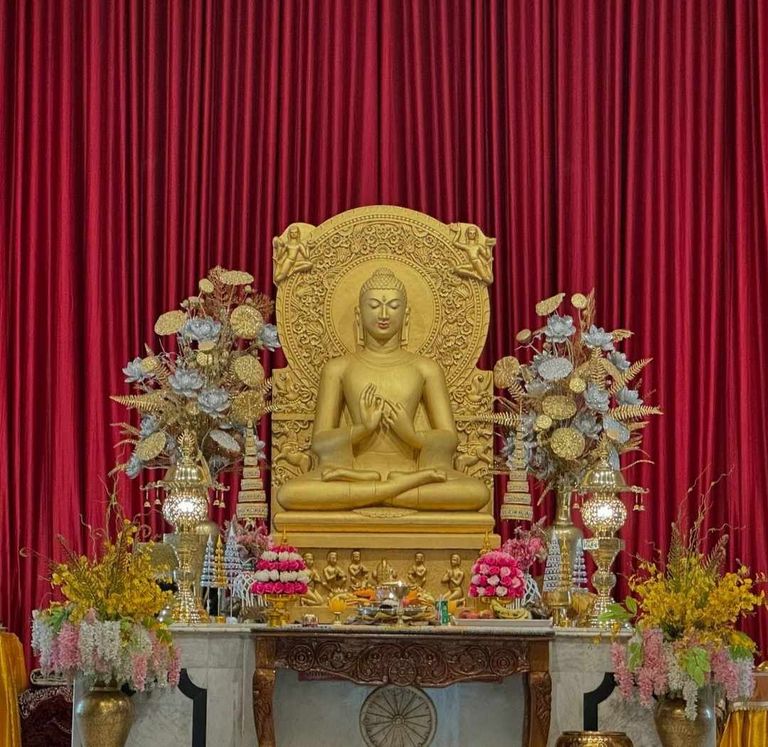
"Varanasi'de yaşam ve ölüm iç içedir. Hindular reenkarnasyona ve karmaya inanırlar. İyi bir hayat yaşarsanız, ölüm size daha iyi bir hayat ve yeni bir beden şansı verir. Kötü bir hayat yaşarsanız, bir sonraki hayatınızda sonuçlarına katlanacaksınız. Hayatında bir daha asla insan olamayabilirsin... döngü devam ediyor. Hayat, Broried, Ölüm ve Renorth ... Batı'da öldüğünüzde cehennemde cennete gideceksin. Ölüm ve birçok halat ... burada ölüm konusunda endişelenebilir, ancak yaşamın yaşamında düşünülebilir. Reenkarnasyon Hinduları hayatlarının hizmetkarlarına dönüştürür. Çünkü geleceklerini şekillendiriyorlar. Bu da onlara her zaman daha iyisini yapabilme umudunu veriyor... Yani yeniden doğuşun temeli daha iyisini yapabilmektir. Peki bunu yaptığınızda ne olur? Geri dönmeye gerek yok mu? Başka bir varlığı var mı? Mutlak varoluş olan sonsuzlukla bir olurlar. Halk dilinde buna Tanrı denir. Çünkü sonsuza kadar var olan tek varlık O'dur. Sonuçta yeniden doğmak istemezler... Yani hal, bedensellikten saf enerjiye geçiş durumudur... Buna aynı zamanda kurtuluş da denir... c yani onların deyimiyle "moksha" BT. . Doğum döngüsünden geçmek... Moksha'ya genellikle birçok yaşam döngüsünden sonra ulaşılır. Ancak kendi cennet biçimleri olan Moksha'ya ulaştıklarında asla dünyaya geri dönmeyeceklerine inanırlar. Ancak Hindular, Varanasi'deki Ganj Nehri'nin sonsuz yaşamın yoluna çıktığına ve onlara bir sonraki doğuma kadar taşıyacak gücü verdiğine inanıyor.
“In Varanasi, life and death are intertwined. Hindus believe in reincarnation and karma. If you live a good life, death gives you the chance for a better life and a new body. If you live a bad life, you will suffer the consequences in your next life. You may never be human again in your life... the cycle continues. Life, Broried, Death and Renorth... When you die in the West you will go to heaven in hell. Death and many ropes ... here you can worry about death, but in life of life can be considered in life. Reincarnation turns Hindus into servants of their lives. Because they shape their future. And that gives them the hope that they can always do better. So the basis of rebirth is to do better. And what happens when you do that? Is there no need to go back? Is there another existence? They become one with infinity, which is absolute existence. Colloquially, this is called God. because He is the only being that exists forever. Ultimately they don't want to be reborn. So the state is the transition from corporeality to pure energy... It's also called liberation... c or as they call it “moksha” BT. Going through the cycle of birth... Moksha is usually reached after many life cycles. But they believe that once they reach Moksha, their form of heaven, they will never return to earth. Hindus, however, believe that the Ganges River in Varanasi stands in the way of eternal life and gives them the strength to carry them through to the next birth.
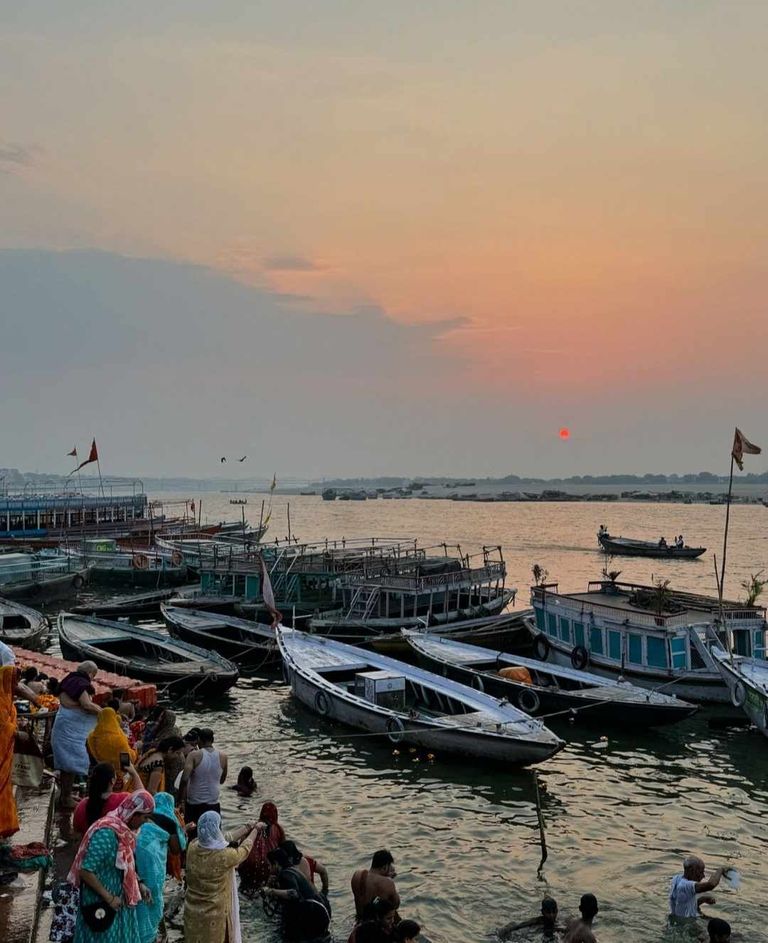
Bir ateş topu... Küller havada uçtu... Eğer onları kapatırsam sıcaktan dolayı bir daha açamayacağımı bilerek gözlerimi kocaman açtım ve bu manzaraya baktım, ta ki gözlerime kadar. gözler. bırak gitsin... Yanımdaki arkadaşım kısa bir video çekti, burada bir kesit yayınladım... Etrafımdaki birçok insan hüzün kokuyor... ama hayır, ben değil... Sonunu görün. hayata bakış açımı sorgulamama bir boyut daha eklendi... Biz haftanın yedi günü ölülerini Ganj'a taşıdığımız yolda yas tutanlar da aynı yolu izliyor. Bunun ruhun yolculuğunu kolaylaştırdığı söylenir. Her nasılsa onlara göre bu sevinilecek bir şey. Sevdiklerini kaybetmenin acısını çekerler ama o kişinin hayatında çok daha iyi bir yere gittiğine inanırlar. Ölüye en yakın olanlar küçük bir kuyruk bırakarak başlarını tıraş ederler, aile iki hafta boyunca su dışında hiçbir şey yiyip içmez... Varanasi'deki ölü yakma özeldir... Ganj en kutsal yerdir. Hindistan'ın kutsal nehrinin ortasında..
A fireball... Ashes flew in the air... Knowing that if I closed them I would never be able to open them again because of the heat, I opened my eyes wide and looked at this view, until my eyes... eyes... let it go... My friend who was with me took a short video, I posted an excerpt here... Many people around me smell of sadness... but no, not me... See the end. It added another dimension to my questioning of my outlook on life... The way we carry our dead to the Ganges seven days a week, mourners follow the same path. This is said to facilitate the soul's journey. Somehow, for them, this is something to rejoice about. They feel the pain of losing a loved one, but they believe that the person has gone on to a much better place in their life. Those closest to the deceased shave their heads, leaving a small tail, and the family eats and drinks nothing but water for two weeks... The cremation in Varanasi is special... The Ganges is the holiest place. In the middle of India's holy river.

. Ve burası da... Kuzeyde Himalayalar'dan güneyde denize akıyor. Ancak bu yolculuğun bir noktasında Ganj'ın kuzeye doğru aktığı bir kısım vardır. Varanasi de onlardan biri. Ganj nehrinin kuzeye doğru akan batı yakası en kutsal yer sayılıyor. Varanasi ve Manikarnika'daki ölü yakma töreni son ölü yakma töreni olarak kabul ediliyor. Çünkü daha fazla doğuma gerek kalmadan doğrudan Moksha'ya (kurtuluş) götürür. Dolayısıyla Varanasi'ye ölmeden önce gelirseniz burada öleceksiniz ve yanacaksınız, bir nevi kestirme yol, doğup tekrar denemenize gerek yok; Burada ölmek için Varanasi'ye gelmeniz yeterli... Bu şehre ölmeye gelen çok sayıda Hindu'nun olmasının nedeni bu...
. And this place... It flows from the Himalayas in the north to the sea in the south. But at some point on this journey, there is a part where the Ganges flows northward. Varanasi is one of them. The west bank of the Ganges flowing northward is considered the holiest place. The cremation ceremony in Varanasi and Manikarnika is considered the last cremation ceremony. Because it leads directly to Moksha (liberation) without the need for further births. Therefore, if you come to Varanasi before you die, you will die and burn here, a kind of shortcut, no need to be born and try again; it is enough to come to Varanasi to die here... That's why there are so many Hindus who come to this city to die...

Krematoryumdan çıktıktan sonra kafamda birçok düşünce taşıyarak yakındaki Kathwala Tapınağı'na (Nepal Tapınağı) gittik. Kamasutra'dan çeşitli duruşların tasvir edildiği bu ahşap tapınakta genç Hindular da eğitim alıyor... Tapınak kutsal Ganj'a bakan mükemmel bir konumda.. Bahçesinin önünden geçerken bir öğrenci bir kayanın üzerinde ders çalışıyordu. ama bir an olsun yüzümüze bakmadılar... "Öğrendikleri şey meditasyondu. "Hayatın her alanında işe yarıyor" dedim kendi kendime... Tapınağın diğer tarafında, Ganga'nın yanındaki pencerede başka bir kişi kitabını okuyordu... Bulunduğunuz sessiz ve huzurlu bir yer. kapıdaki büyük zili çalarak içeri girmesi söylendi. Gördüğümüz neredeyse tüm tapınakların girişlerinde irili ufaklı çanlar vardı. Zili çaldığınızda Tanrı'ya geldiğinizi söylersiniz... Tapınak alanındaki Nandi, Shiva'nın kutsal hayvanı olan inektir... Dileklerinizi Nandi'nin kulağına söylerseniz söyleyeceğine inanılır. Shiva ve dileklerin hemen gerçekleşecek. Shiva üç büyük tanrıdan biridir ve her zaman meditasyon yaptığı için Nandi onun koruyucusudur... Aslında ben de fırsat bulup fikrimi onun kulaklarına söyledim... Pek çok dileğimi bile hatırlamıyorum. Hindistan seyahatim sırasında tamamlandı :)
After leaving the crematorium we went to the nearby Kathwala Temple (Nepalese Temple) with many thoughts in my head. In this wooden temple, where various postures from the Kamasutra are depicted, young Hindus also study... The temple is in a perfect location overlooking the sacred Ganges. As we passed by the garden, a student was studying on a rock, but they didn't look at us for a moment... “What they were learning was meditation. “It works in all walks of life,” I said to myself... On the other side of the temple, by the window next to the Ganga, another person was reading his book... It is a quiet and peaceful place you are in. he was told to come in by ringing the big bell on the door. Almost all the temples we saw had large and small bells at the entrance. When you ring the bell you are telling God that you have come. Nandi on the temple grounds is the cow, Shiva's sacred animal. It is believed that if you speak your wishes into Nandi's ear, she will tell you. Shiva and your wishes will come true immediately. Shiva is one of the three great gods and Nandi is his protector because he is always meditating... I actually took the opportunity to speak my idea into her ears. I don't even remember many of my wishes, they were fulfilled during my trip to India :)
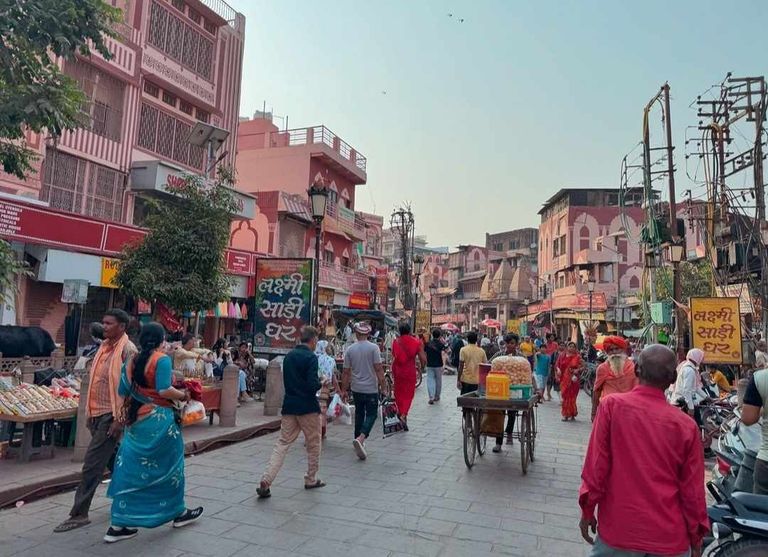
Varanasi'de Ganj'a giden tüm yollarda artık yeni imar planları yapılıyor... Tepedeki tüm binalar yıkılıyor, sadece çeşitli tapınaklar. Ayrıca binaların içinde bile ibadet yeri bulunduğundan dikkatli bir şekilde ve azar azar yıkılıyor. Amaçları Ganj'ı yukarıdan da görünür kılmak... İşe yarıyor gibi... Nehir tepeden görülmeye başladı bile... Dağın zirvesinde durum bu... En önemlisi . Buradaki tapınak Shri Kashi Vishwanath Tapınağıdır (Altın Tapınak). Tapınak altınla kaplı... Belli bir mesafeyi geçmemize izin vermiyorlar, demir barikatları engelliyorlar... Şiva'nın kaldığına inanıyorlar. işte yeri gelince...
In Varanasi, all the roads leading to the Ganges are now being redeveloped. All the buildings on the hill are being demolished, only the various temples. And even inside the buildings there are places of worship, so they are being demolished carefully and little by little. The aim is to make the Ganges visible from above... It seems to be working... The river is already visible from the top... This is the situation at the top of the mountain... The most important thing. The temple here is the Shri Kashi Vishwanath Temple (Golden Temple). The temple is covered in gold... They don't allow us to cross a certain distance, they block the iron barricades... They believe that Shiva remains, so when the time comes...
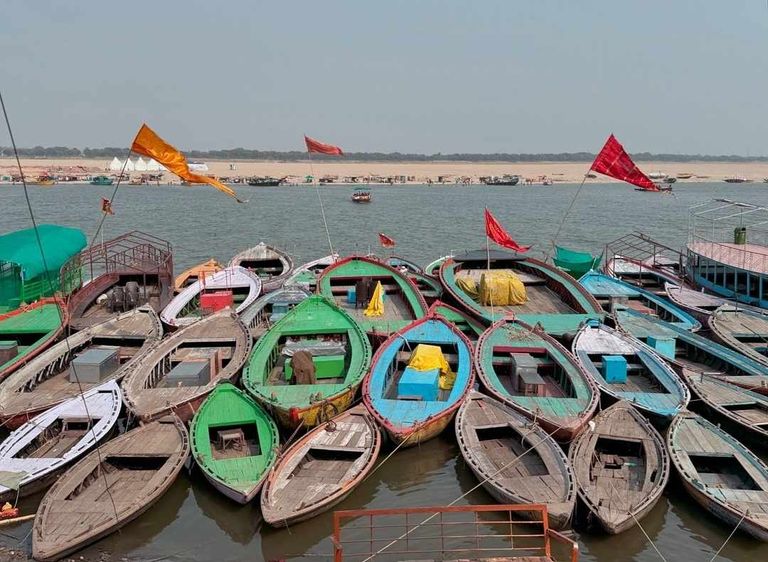
Ancak sadece Varanasi'de 100.000'den fazla tapınağın olduğu gerçeği küçük bir yan not... Aarti yerine giderken yaşlı bir adam bize nereden geldiğimizi sordu. "Biz Türkiyeliyiz" dediğimde hemen "Mustafa Kemal Paşa" diye cevap verdi... Ona saygı duyduğu her haliyle belliydi. Ve elbette gurur duyuyoruz!…
Her akşam saat 19.00'da kutsal Ganga'nın yanında bir festival düzenleniyor. Aarti Festivali Yaklaşık bir saatimiz olduğu için nehre ve nehir kenarındaki terasa bakarken Hindistan'a dair özel bir şeyin tadını çıkarmaya karar verdik... Ayrıca Varanasi'de vejetaryen yemek de şart. Dindar bir ülke olduğu için bu ülkede inançlarından dolayı et yemiyorlar... Yemek sırasında rehberimiz Varanasi'nin dört ismi.
But the fact that there are more than 100,000 temples in Varanasi alone is a small side note... On the way to the aarti place, an old man asked us where we were from. When I said “We are from Turkey” he immediately replied “Mustafa Kemal Pasha”... It was obvious that he respected him. And of course we are proud!....
Every evening at 19.00, a festival is organized next to the sacred Ganga. Since we had about an hour, we decided to enjoy something special about India while looking at the river and the riverside terrace... Also, vegetarian food is a must in Varanasi. As it is a religious country, they don't eat meat in this country because of their beliefs... Four names of Varanasi, our guide during dinner.